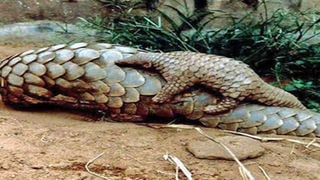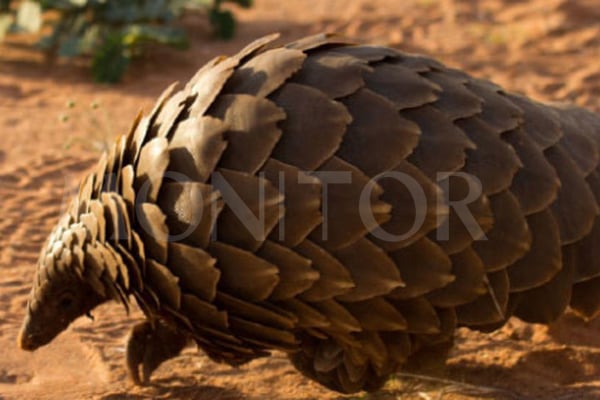
Pangolins have been heavily targeted for poaching and trafficking in Uganda. PHOTO/COURTESY
|Pangolin nears extinction
What you need to know:
Pangolins whose scales are in demand for use in Chinese medicine, are now among the world’s most trafficked mammals.
Uganda is greatly endowed with wildlife, flora, and fauna but more so the diverse culture filled with animal totems, cultural dances, languages, and tribes.
However, its diversity in wildlife is threatened by both poaching and wildlife trade.
There are 56 tribes and about nine indigenous communities that are formally recognised in the 1995 Constitutional Amendment of 2005 Uganda.
Out of the 56 tribes, one of the tribes in Central Uganda is Buganda. The Buganda Kingdom has about 52 clans or totems ranging from Musu (Cane rat) to Lion (Mpologoma), Buffalo (Mbogo), Mamba (cat fish , Lugave (Pangolin) Mmamba (Lungfish) and Ngeye (Colobus monkey) among others.
Totem and the clan are intimately connected. Names are given depending on one’s clan. It is taboo for a Muganda to eat his or her totem. It is important to distinguish between the totem and clan. A clan is determined by genealogy while a totem is a symbol to represent the clan.
A totem is an object (such as an animal or plant) serving as the emblem of a family or clan and often as a reminder of its ancestry.
It is alleged that when a person belonging to a clan eats meat of the particular animal or clan to which he/she belongs, he develops a severe stomachache and fever with vomiting. This explains the abandonment of eating meat of that animal.
However, there is a growing threat that these species would become extinct due to poaching. The diversity of these species in wildlife is threatened by both poaching and wildlife trade.
Pangolins - one of the most targeted species - whose scales are on demand for use in Chinese medicine, are now among the world’s most trafficked mammals.

As rising demand for pangolin scales and meat drives this specie to extinction, Buganda clan members of Lugave (pangolin) are equally concerned.
Pangolins are nocturnal and have poor eyesight, relying on their hearing and sense of smell to locate their prey at night. They are long, powerful, their curved claws tear open anthills or termite mounds, and with no teeth, they use a sticky elongated tongue to retrieve insects.
It is also a small, shy and harmless creature with tough overlapping keratin scales. It is the only mammal known to have such large protective keratin scales covering their skin. They are made from the same material that makes up human fingernails and rhinoceros horns.
Conservationists warn of pangolin extinction
Animal environmentalists have warned about the imminent extinction of pangolins in the country if no serious conservation efforts are put in place to protect them.
Although government has enhanced the laws against illegal wild life trade, there is need to enhance the benefits for people around the parks in order for them to see protection of wildlife as beneficial.
Threats
In 2019, the Uganda Revenue Authority (URA) in an operation at Elegu on the Uganda – South Sudan border seized 3.2 tonnes of elephant ivory and 423 kilogrammes of pangolin scales with an estimated value of $2.3 million and $1.2 million, respectively.
Customs officials discovered the consignment in three containers concealed in logs of wood and wax in transit from the Democratic Republic of Congo to Asia.
There are eight species of pangolin: four found in Asia and four found in Africa. They have traditionally been consumed in both regions.
Pangolins have a slow reproductive rate, with females giving birth to only one or two offspring per year, which makes it difficult for populations to recover from over-hunting.
It is the second most smuggled wildlife item after Ivory in Uganda. According to Traffic, a wildlife trade organisation, pangolins have been heavily targeted for poaching and trafficking in Uganda. Between 2012 and 2016, over 1,400 pangolins were seized.
Despite commemorating the World Pangolin Day on February 20, the trade in these elusive mammals is staggering. More than 1 million pangolins were trafficked over a 10-year period.
Fighting wildlife trade
According to the wildlife conservationists, Uganda must address enforcement and governance failures to protect pangolins, invest in and promote herbal and synthetic medicine, and support for alternative livelihoods and education within the countries where the animals exist.
In 2019, the Parliament of Uganda enacted stringent Uganda Wildlife Act 2019 to protect wildlife and strengthening conservation.
Conserving pangolin
Bashir Hangi, spokesperson at the Uganda Wildlife Authority (UWA) says that UWA is trying its best to conserve the pangolin.
“We do not keep animals in captivity because of our free-range conservation model. We cannot keep the pangolin in one place hence making it to be outside the protected area,” Hangi says.




